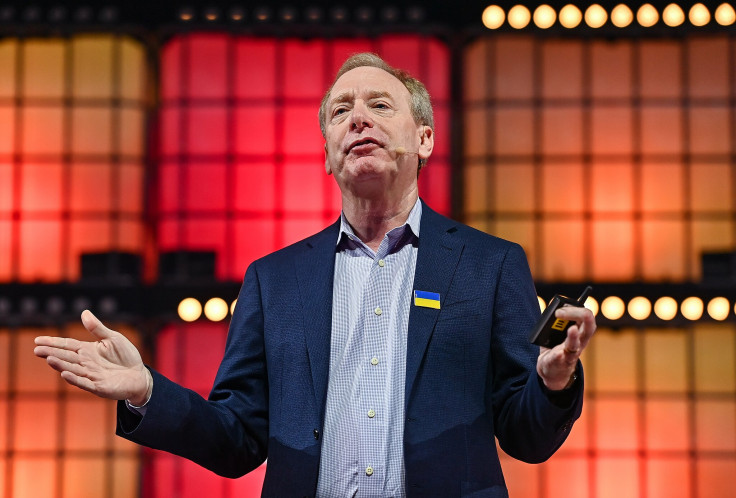Microsoft president Brad Smith warns AI can be weaponised
Microsoft's president Brad Smith urged for human oversight and regulation of AI.

In an interview, Microsoft's President Brad Smith described AI (artificial intelligence), as a technology that continues to revolutionise multiple domains, including work, education, and more.
The top executive emphasised the importance of human oversight, which is a key mechanism for the governance of AI. Aside from this, Smith stressed the necessity of regulatory measures for the technology.
"It is a tool that can help people think smarter and faster," Smith noted. "The biggest mistake people could make is to think that this is a tool that will enable people to stop thinking," he added.
Is AI dangerous for humans?
It is no secret that AI is a powerful technology. So, it is safe to say that it poses significant threats. Just like other tech leaders, Smith urged for human oversight and regulation of the technology in an exclusive interview with CNBC.
Smith went on to warn that AI can be weaponised and misused for malicious purposes. In the interview held on the sidelines of the Business 20 Summit in New Delhi, India, Smith argued that every technology ever invented can be used as a tool or as a weapon, and AI is no exception.
"We have to ensure that AI remains subject to human control. Whether it's a government, the military or any kind of organisation, that is thinking about using AI to automate, say, critical infrastructure, we need to ensure that we have humans in control, that we can slow things down or turn things off."
While OpenAI boss Sam Altman eased fears about AI destroying the job market earlier this year, he warned that AI could threaten humanity like nuclear war back in May. Altman and other tech giants also urged developers to minimise the risk linked to AI.
Furthermore, Twitter owner Elon Musk, Apple's Steve Wozniak, and others previously demanded a 6-month pause on the development of GPT-4. American business magnate Warren Buffett went on to compare AI to the atomic bomb, claiming it can't be un-invented.
Smith also suggests that using artificial intelligence requires corporate responsibility, coupled with legal and regulatory safeguards. He compared the need for safety measures in AI to the ones in electricity and transportation, like emergency brakes and circuit breakers.
Can we control, regulate artificial intelligence?
Touching upon the concerns surrounding AI's impact on jobs, Smith said that AI is a tool that supplements human work but can't replace it. He also spoke about AI's tendency to get facts mixed up and sometimes to spread misinformation.
Smith said it is important to cross-check AI-generated content. "The ability to take a Word document and turn it into a PowerPoint slide doesn't mean you shouldn't read your PowerPoint slides before you present them. In fact, you should go in and edit them and make them just perfect."
This interview with Smith corroborates the views of IBM chairman and CEO Arvind Krishna, who spoke to CNBC last week, about the impact of AI on white-collar jobs. Krishna said he believes AI will not replace workers. Instead, the technology will enhance workers' skills and productivity.
Krishna also noted that AI is "absolutely not displacing – it's augmenting." Aside from this, he suggested that AI has the potential to boost the GDP. He said AI can make every enterprise process more productive.
"This means you can get the same work done with fewer people. That's just the nature of productivity. I actually believe that the first set of roles that will get impacted are — what I call — back office, white-collar work," he said.
To those unaware, Krishna became IBM's CEO in April 2020, and the company's chairman in January 2021. The executive is currently focusing on AI and hybrid cloud, which he believes are key technologies for the future. In May, IBM announced an AI tool dubbed WatsonX, which enables clients to build, train, and deploy machine learning models.
© Copyright IBTimes 2025. All rights reserved.






















